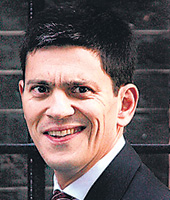
Lanka blasted but not blacklisted by BritainThe British Government has described the situation in Sri Lanka as “grave” in its Human Rights Report for 2007 released last week. Although London says the situation is grave with “human rights abuses manifested as both a symptom and ongoing factor in the conflict”, Sri Lanka does not figure in the British government’s list of 21 countries viewed as of major concern. In what seems like a linguistic slip, the annual report lists these 21 nations as “Major countries of concern” rather than countries of major concern which seems to be what was intended, judging by the countries named and the exclusion of Sri Lanka from it.
When I asked Lord Mark Malloch-Brown, the foreign office minister for Africa, Asia and the Middle East why Sri Lanka was not on the list if the situation in Sri Lanka was as grave as it is made out in the report, he said that because Sri Lanka was not named does not mean London was not concerned. Speaking to me after the launch of the report by foreign secretary David Miliband (see Thoughts From London), Lord Malloch-Brown said he wished to visit Sri Lanka and had mentioned his intention in passing to Sri Lankan ministers. However, diplomatic sources said there had been no formal request by the foreign office minister to visit Colombo and he had been to Sri Lanka previously. Lord Malloch-Brown said he was not antagonistic to Sri Lanka. “I am what might be called a constructive thorn in your side,” he said. The UK report laid the blame on three parties -- government forces, the LTTE and the Karuna faction -- for the reported human rights abuses. “These include extra-judicial killings, disappearances and the use of child soldiers.” The British government states that addressing human rights violations is a central part of its approach in finding a long term solution to the conflict.“It is therefore crucial that reports of human rights violations in Sri Lanka are investigated fully and those responsible brought to justice. We have supported calls by the EU for the introduction of a UN-backed human rights monitoring mission.”It says that one of the main objectives of the UK’s peace-building strategy for Sri Lanka 2006-2009 is improved safety and security in communities and adherence to human rights. “We are promoting the ability of local communities to challenge injustice through the legal system and supporting early warning systems and grass roots dialogue. We work closely with UNICEF to support their work protecting children affected by armed conflict.” Meanwhile, Foreign Minister Rohitha Bogollagama is due in London on Monday night for a series of meetings with British government and Commonwealth officials. He will also give a talk at the International Institute for Strategic Studies. Minister Bogollagama will be having his first bilateral meeting with foreign secretary David Miliband and also calling on home secretary Jacqui Smith. He will be meeting the new Commonwealth Secretary-General Kamlesh Sharma on April 1, the day he assumes office, taking over from Don McKinnon who completed two terms. |
|
||||||
|| Front
Page | News | Editorial | Columns | Sports | Plus | Financial
Times | International | Mirror | TV
Times | Funday
Times || |
| |
Reproduction of articles permitted when used without any alterations to contents and a link to the source page.
|
© Copyright
2008 | Wijeya
Newspapers Ltd.Colombo. Sri Lanka. All Rights Reserved. |
